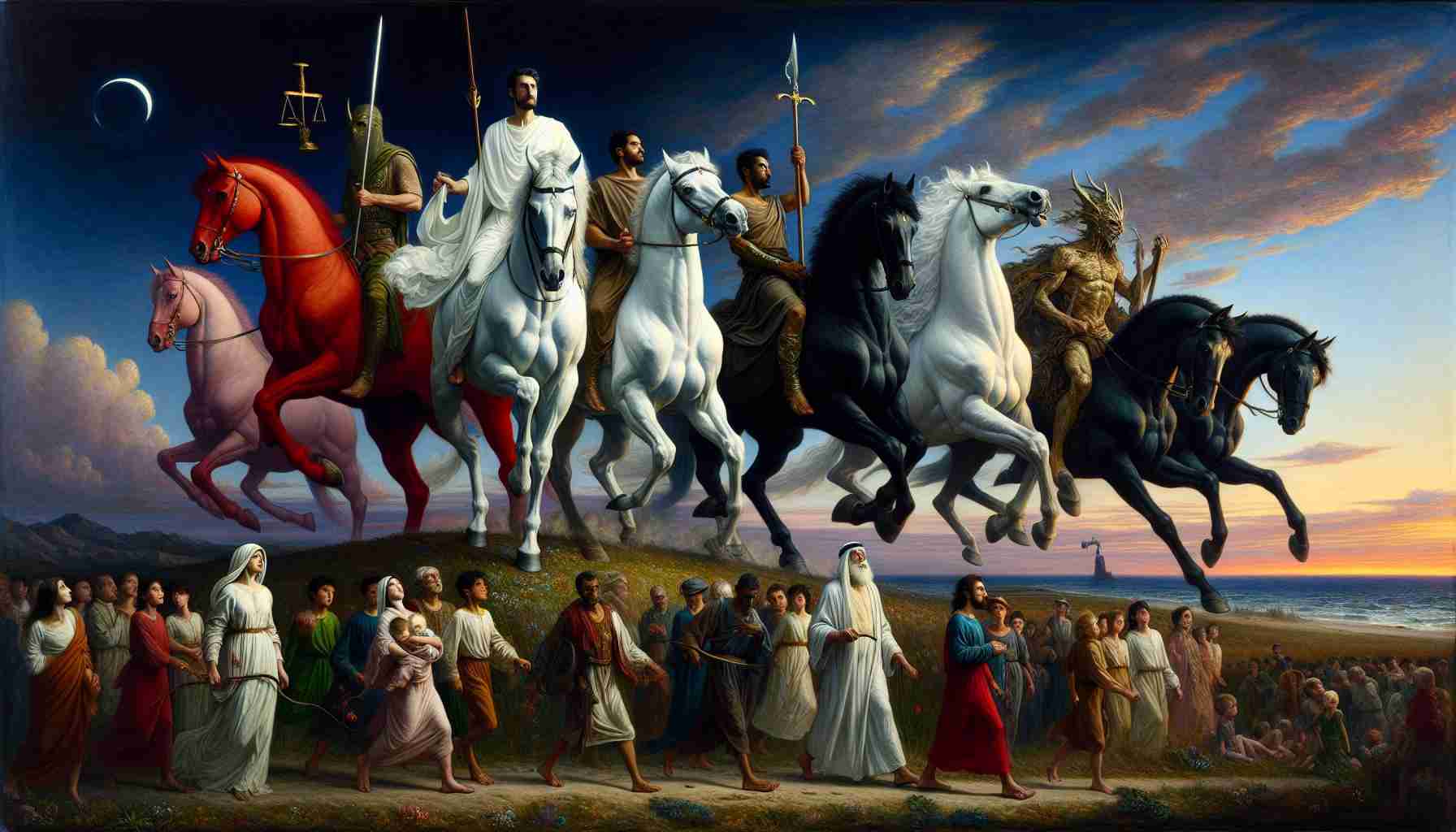

Aaron saw the first horse just before the sky turned dark.
It was white, and its rider held a bow. But no arrow flew. The air grew thick with wind and sand, and Aaron grabbed his daughter Sarai, pulling her close as dust swirled like a storm.
“Abba,” she whispered, her eyes wide. “What is that?”
Aaron didn’t answer. His throat was dry. For weeks, the earth had groaned—famine in the south, fighting in the cities, funerals instead of harvests. People had spoken of peace.
But peace hadn’t come.
Aaron scooped Sarai into his arms and ran for the cellar. Behind them, another rider appeared—on a red horse. His sword dripped though it had not yet been used. War followed him like a shadow.
Down in the darkness, Sarai clung to his cloak.
“Tell me a psalm,” she whispered.
Aaron tried to steady his voice. “The Lord is my shepherd... I shall not want…”
A scream echoed outside. Then silence.
“Will He find us?” Sarai asked.
Aaron looked at her—eight years old, thin from hunger. He couldn’t lie.
“I don’t know,” he said softly.
He thought of the old prophets—Ezekiel, Jeremiah—who had warned of these days. He had heard their words once, and forgotten them. But now the world felt like one of their scrolls, torn open.
The ground shook again.
A third rider passed by—this time on a black horse, holding scales in his hand. The price of food had risen so high, even a full day’s wages couldn’t buy bread. Aaron’s stomach growled. Sarai hadn’t eaten in two days. Their neighbors’ well had run dry.
Still they waited in the dark.
Then came the fourth.
The pale horse.
Its rider said nothing, but behind him came sickness, silence, and death. Even the birds outside had gone quiet.
Aaron held Sarai close, rubbing her back as she fell asleep. Her breathing was soft, but her body was weak.
He looked up into the dark cellar ceiling. “Why haven’t You taken us yet?” he whispered.
There was no answer. Only stillness.
And then—a memory.
Years ago, during a drought, he’d heard his father pray these words over their dry fields:
“Even now... yet will I trust You.”
Even now.
Aaron spoke the words aloud.
They felt small. But they stayed.
“Even now,” he repeated.
He pressed his hand to Sarai’s chest. Her breath rose and fell. That alone felt like a promise.
Outside, the sound of hooves faded.
Further now. Not closer.
Maybe the riders had seen them.
Maybe they had passed.
Aaron didn’t move. He sat in the silence, watching the candle’s last flame flicker against the stone wall.
He closed his eyes.
One breath.
Then another.
Aaron saw the first horse just before the sky turned dark.
It was white, and its rider held a bow. But no arrow flew. The air grew thick with wind and sand, and Aaron grabbed his daughter Sarai, pulling her close as dust swirled like a storm.
“Abba,” she whispered, her eyes wide. “What is that?”
Aaron didn’t answer. His throat was dry. For weeks, the earth had groaned—famine in the south, fighting in the cities, funerals instead of harvests. People had spoken of peace.
But peace hadn’t come.
Aaron scooped Sarai into his arms and ran for the cellar. Behind them, another rider appeared—on a red horse. His sword dripped though it had not yet been used. War followed him like a shadow.
Down in the darkness, Sarai clung to his cloak.
“Tell me a psalm,” she whispered.
Aaron tried to steady his voice. “The Lord is my shepherd... I shall not want…”
A scream echoed outside. Then silence.
“Will He find us?” Sarai asked.
Aaron looked at her—eight years old, thin from hunger. He couldn’t lie.
“I don’t know,” he said softly.
He thought of the old prophets—Ezekiel, Jeremiah—who had warned of these days. He had heard their words once, and forgotten them. But now the world felt like one of their scrolls, torn open.
The ground shook again.
A third rider passed by—this time on a black horse, holding scales in his hand. The price of food had risen so high, even a full day’s wages couldn’t buy bread. Aaron’s stomach growled. Sarai hadn’t eaten in two days. Their neighbors’ well had run dry.
Still they waited in the dark.
Then came the fourth.
The pale horse.
Its rider said nothing, but behind him came sickness, silence, and death. Even the birds outside had gone quiet.
Aaron held Sarai close, rubbing her back as she fell asleep. Her breathing was soft, but her body was weak.
He looked up into the dark cellar ceiling. “Why haven’t You taken us yet?” he whispered.
There was no answer. Only stillness.
And then—a memory.
Years ago, during a drought, he’d heard his father pray these words over their dry fields:
“Even now... yet will I trust You.”
Even now.
Aaron spoke the words aloud.
They felt small. But they stayed.
“Even now,” he repeated.
He pressed his hand to Sarai’s chest. Her breath rose and fell. That alone felt like a promise.
Outside, the sound of hooves faded.
Further now. Not closer.
Maybe the riders had seen them.
Maybe they had passed.
Aaron didn’t move. He sat in the silence, watching the candle’s last flame flicker against the stone wall.
He closed his eyes.
One breath.
Then another.